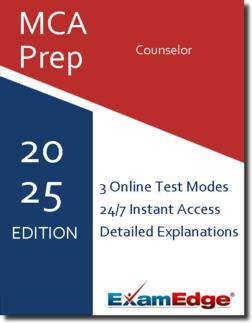MCA Counselor (056) Practice Tests & Test Prep by Exam Edge - Topics
Based on 28 Reviews
- Real Exam Simulation: Timed questions and matching content build comfort for your MCA Counselor test day.
- Instant, 24/7 Access: Web-based MCA Counselor practice exams with no software needed.
- Clear Explanations: Step-by-step answers and explanations for your MCA exam to strengthen understanding.
- Boosted Confidence: Reduces anxiety and improves test-taking skills to ace your MCA Counselor (056).

Understanding the exact breakdown of the MCA Counselor test will help you know what to expect and how to most effectively prepare. The MCA Counselor has 100 multiple-choice questions The exam will be broken down into the sections below:
| MCA Counselor Exam Blueprint | ||
|---|---|---|
| Domain Name | % | Number of Questions |
| Student Development, Learning, and Guidance | 30% | 30 |
| Comprehensive School Counseling | 40% | 40 |
| Professional Knowledge and Practice | 30% | 30 |


